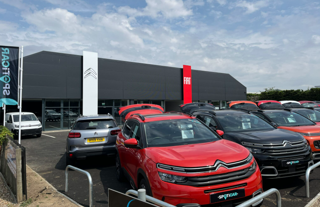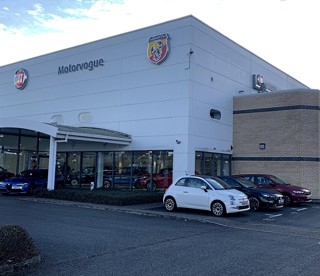[gallery id=1337]
That intent is conditional, however. Pochin has developed an operating model distinct from the traditional solus dealership, and Motorvogue’s expansion will depend on being able to replicate this model in other market areas.
For Pochin, it’s all about scale. Not the type of scale that comes with the likes of Sytner, Pendragon and Lookers, but scale in terms of each site: a property footprint that allows him to incorporate showrooms for five or six brands, separated by walls if those brands demand, and served by a single, large, multi-franchised workshop.
[gallery id=1337]
Like many entrepreneurs with their own money invested in franchised motor retailing, Jon Pochin is carefully considering how the market is changing. But unlike some time-served owner-drivers who are seeking to sell up and get out, the managing director of Motorvogue is intent on getting in deeper.
That intent is conditional, however. Pochin has developed an operating model distinct from the traditional solus dealership, and Motorvogue’s expansion will depend on being able to replicate this model in other market areas.
For Pochin, it’s all about scale. Not the type of scale that comes with the likes of Sytner, Pendragon and Lookers, but scale in terms of each site: a property footprint that allows him to incorporate showrooms for five or six brands, separated by walls if those brands demand, and served by a single, large, multi-franchised workshop.
He believes it could be the way forward for franchises with relatively small market shares. Pochin and Peter Norman, his business partner, bought single-site Motorvogue’s Fiat and Alfa Romeo franchise in 2008, and has since added Abarth, Seat and Suzuki franchises at the same location. It opened a Bedford branch in mid-2015 and now holds Abarth, Alfa Romeo, Fiat, Hyundai, Jeep, Seat all under one roof. Renault, Dacia and Citroën are due to be rehomed alongside later this year, after Pochin acquired the franchises from Wests Group in late 2016. It simultaneously acquired Wests Renault and Dacia in King’s Lynn, to which it is adding Abarth, Alfa Romeo, Fiat and Jeep franchises.
“I think it’s going to be very difficult to be a single-site operator in future,” said Pochin.
“If you’re paying market rent etc. then making 1% is nearly impossible, I think, because you have very unique circumstances and you don’t have that buying ability to get extra margin when you’re buying finance or oil or whatever.”
The Northampton, Bedford and King’s Lynn sites share some characteristics: a spacious plot, significant frontage onto a major thoroughfare, and major non-automotive retailers, including Tesco, Marks & Spencer, B&Q and Asda, as neighbours.
For Motorvogue, becoming part of a shopping destination is critical, both for brand awareness and ease. Pochin recognises that consumers value their time and convenience more highly than ever, both online and in the physical world. Having the ability to provide choice between many brands in one location fits that trend.
Structuring multi-brand sales
The business still has a dedicated sales manager and sales executives for each brand on each site, because they still compete with other brands that have that solus focus.
Overseeing those sales teams are three group managers – one for Fiat, Abarth, Alfa and Jeep, one for Hyundai and Seat, and one for Renault, Dacia and Citroën. Their role encompasses the relationship with the manufacturer, brand stock management, marketing, standards and setting budgets.
Pochin believes this structure works better than having a general manager at each location, who may then favour one particular brand over another.
That structure also allows the group to expand further with the brands Motorvogue already represents, which is a strategic ambition for Pochin.
“If you have one of something, it doesn’t maximise the benefit. The more you have, the more focus you get, the more expertise and sales drive you get from that brand.” Long-term, he said he will look for more businesses east of the M1 motorway.
He has had several offers and considered several potential acquisitions of single-brand locations with franchises the group doesn’t currently hold, but said he couldn’t see the viable return.
“If the profit is so marginal when the business is flying, then if it slips or the market slips there is no income at all or losses are significant. Factor in the way that cars are developing – they are far more reliable, the service intervals have gone up, if the trend continues into battery or hydrogen cars, then the major servicing won’t be what it has been. You have to look at the business model in the next 10 years and consider that if you’re a sub-5% share brand, will you be able to sustain a full, busy workshops to balance the business model?
“But against that, if you have five or six brands, working within one facility, it creates choice for customers as brands experience their ups and downs, and there are synergies and cost savings that come with that.”
The Bedford multi-brand complex alone generated £25 million sales in its first year, from a completely cold start.
Allowing staff to make mistakes
Pochin likes to allow individuals to develop, promoting from within where possible, and building the team so that individual members complement each other. The importance of giving people opportunities to develop their strengths was something Pochin learned early in his career from his boss and mentor.
 He joined the industry as a teenage YTS trainee in the parts department of a Desira Group dealership in Norfolk. By the age of 24, he had become director of Desira’s parts business, which was turning over more than £20m at its peak. That role expanded to include aftersales responsibilities and by his early 30s, Pochin had become operations director of the £120m+ turnover multi-franchise group and took responsibility for its sales performance.
He joined the industry as a teenage YTS trainee in the parts department of a Desira Group dealership in Norfolk. By the age of 24, he had become director of Desira’s parts business, which was turning over more than £20m at its peak. That role expanded to include aftersales responsibilities and by his early 30s, Pochin had become operations director of the £120m+ turnover multi-franchise group and took responsibility for its sales performance.
“What I did differently to others was I’ve always been positive and can-do. I’d get in a car and drive to Burnley from Norfolk to see another Fiat dealer and get his parts business. I’d always do what other people wouldn’t. I couldn’t say I was more intellectual than any others, but I had a want and a desire to get things done.
“And I was always very good at doing what I needed to do to achieve a target. I don’t think it matters if it’s an internal or a
manufacturer target, if you go for it and show you’ve done all you can, then it’s easy to go to your boss or manufacturer and show them the evidence.
“One of John Desira’s traits was you were allowed to get on with it, and you were allowed to make mistakes. You didn’t get shouted down, or get the negativity, when things went wrong. He was very hard in some ways, but allowing in others. It allowed you to develop. He saw that.”
Pochin has grasped that being a business leader is about understanding people. He cites a theory that no one can possibly be 100% ideal for any role, and therefore one task of any business leader is to identify the weaknesses in an individual and build a team that compensates for that, with other members whose strengths are in that area.
Across its four sites – the Renault, Dacia and Citroën businesses in Bedford are still on the old Wests site awaiting the relocation this year – Motorvogue has 125 staff. It has adopted a five-day week for sales staff, to allow them a better work/life balance, and has raised their basic salary.
“The days are long and we expect a lot, but I’d rather have someone work five days full-on and do a proper job,” he said.
The potential of part-timers
There are a few part-time technicians in the group, and the business is also trialling part-time sales executives, covering three days across the weekend. They arrange their handovers for when they are working or come in specifically to do it, and still run a sign-written company car so that the rest of the week when they are picking up their grandchildren from school or going to the supermarket the dealerships are getting free exposure.
Pochin believes the motor retail industry has missed out on the part-time sales talent, such as semi-retired people and working mothers, which the supermarkets and DIY stores have recruited successfully.
 “The industry has stuck to rigid lines, expecting salespeople to work five or six days per week, to not go home until mid- evening, to sacrifice part of their home life for their job.
“The industry has stuck to rigid lines, expecting salespeople to work five or six days per week, to not go home until mid- evening, to sacrifice part of their home life for their job.
“We have to come up with a solution because in our industry staff turnover has been so much. People will find reasons to not do it, but we have to find a different solution. The industry strangles change and is quick to sway back to tradition – you have to employ these people on these hours because that’s how we’ve always done it.
“But I can’t think of any other retailer that doesn’t staff according to the volumes of people who may come in. You don’t need seven salespeople in a showroom on a Tuesday or a Wednesday, but you certainly do on a Saturday and Sunday. Yet this industry expected everyone in on a Saturday but half the team off on a Sunday, because it always has. That’s our second busiest day of the week. And you can’t expect everyone to work every weekend, so you have to come up with something else that works.”
Pochin is also conscious that the only building that doesn’t open on a Sunday on the whole retail park surrounding his Bedford complex is his service workshop.
Once the Renault, Dacia and Citroën operation moves on site this year, there may be capacity issues, so Pochin is already considering his options and has begun consultations with staff. One
possibility is his aftersales staff working a four-day working week, 10 hours per day. Currently they work five-and-a-half days one week and five days the next, and Pochin suspects changing that to give them three days off consistently for family time would be welcomed.
The decision whether to go ahead with weekend servicing will also depend on the certainty of sufficient extra business – while it appears convenient for customers visiting the nearby shops or enjoying their day of rest, Pochin needs to investigate what real demand there will be. He trialled evening opening during the week, and found it did not bring the required sales increase.
For many dealers, who are seeing their service business in decline, all-weekend servicing doesn’t make sense, he said. He added that the industry seems to have accepted that 100% overhead absorption by aftersales is no longer achievable. Perhaps his model may prove otherwise.
Now it has gained scale since the Wests acquisitions, Motorvogue is investing in its own marketing department, including a dedicated role for social media and another for database marketing. Previously it used an agency.
Marketing the destination
Marketing activity takes two routes: naturally, it promotes each of its car brands and offers individually, but it is also able to market each Motorvogue site as a destination. For example, it highlights that car buyers can come to see 10 different SUVs or dozens of new cars on a Motability scheme all in one place. It’s a tactic that perhaps reflects Motorvogue’s close competition from car supermarkets CarShop and Imperial Cars in Northampton, and Sandles and Stebbings in King’s Lynn.
Shaping Motorvogue's stock profile
This year, Motorvogue is focusing on its used car operations. Pochin said it has become disciplined, with a 90-day stocking policy and trigger points for repricing. Since late 2016, it has been analysing used car data through its DMS, to understand which cars sell quickly and most profitably, thereby shaping its stock profile.
All sales managers are targeted on used car spaces, with Pochin taking a supermarket-style approach to stock turn. The used car spaces are reviewed two or three times a year and if a particular brand on site has not been doing the numbers, some of its forecourt space may be reallocated to one of the brands that is selling better.
The used car stock is up to five years old and 60,000 miles, and Pochin wants at least 50% to be older than two years to avoid too much conflict between new and nearly new offers. Non-franchise part-exchanges are sent to auction, because Motorvogue prefers each dealership to fill its 100-120 spaces with stock from its own brands and secure that buyer for its workshop where possible.
At some point, Pochin sees the group opening a small used car supermarket in a town where it doesn’t currently operate – to avoid competing with his own dealerships – which could retail the better part-exchanges and surplus stock.
Going it alone on motor retail
Pochin has no regrets about leaving a senior role at a long-established 12-site dealer group in 2007 and buying his own business, even though the recession bit in his first year running Motorvogue.
He said he learned a great deal at Desira but knew that if he didn’t take the plunge then he would never have done so. He had Fiat’s approval to buy the Northampton site, and the backing of Peter Norman, Desira’s former chairman and a former banking executive.
Ten years later, he believes the entrepreneurial side of the industry may enjoy a resurgence: “The industry will see a change, because it seems to flex to these supergroups with their big strategies and then it seems to come back a bit. If manufacturers don’t invest and take some risk with some individuals to create other choices, where do they go?”
He believes some smaller manufacturers will understand they need to invest in alternatives, otherwise you have ‘supergroups’ that desire to grow and grow with larger market share brands that may not have the focus on what their own needs might be.
He described the supergroups as aiming to become the Waitroses of the industry, and said Motorvogue knows its place: “We’re a Sainsbury’s, that’s what we do, and that’s why we’ll look to continue to develop with the brands we’ve got.”
The business is ambitious. Pochin expects 2017 turnover to reach £85m, and to grow to about £150m by the end of 2020 as its new businesses improve and it perhaps expands again.
He reiterated the goal: “To build a regional group to a sustainable business model that is able to compete in the future. I think the next 10 years will bring more significant change than the past 20, and, as property costs continue to go up, we have a business model in our multi-franchise concept that will allow aftersales absorption to go back to levels that massively make a difference while being in a viable location.”
Return on sales is currently 1.7%. He believes the business model will allow it to consistently make 2% in future.
Login to continue reading
Or register with AM-online to keep up to date with the latest UK automotive retail industry news and insight.




















Login to comment
Comments
No comments have been made yet.